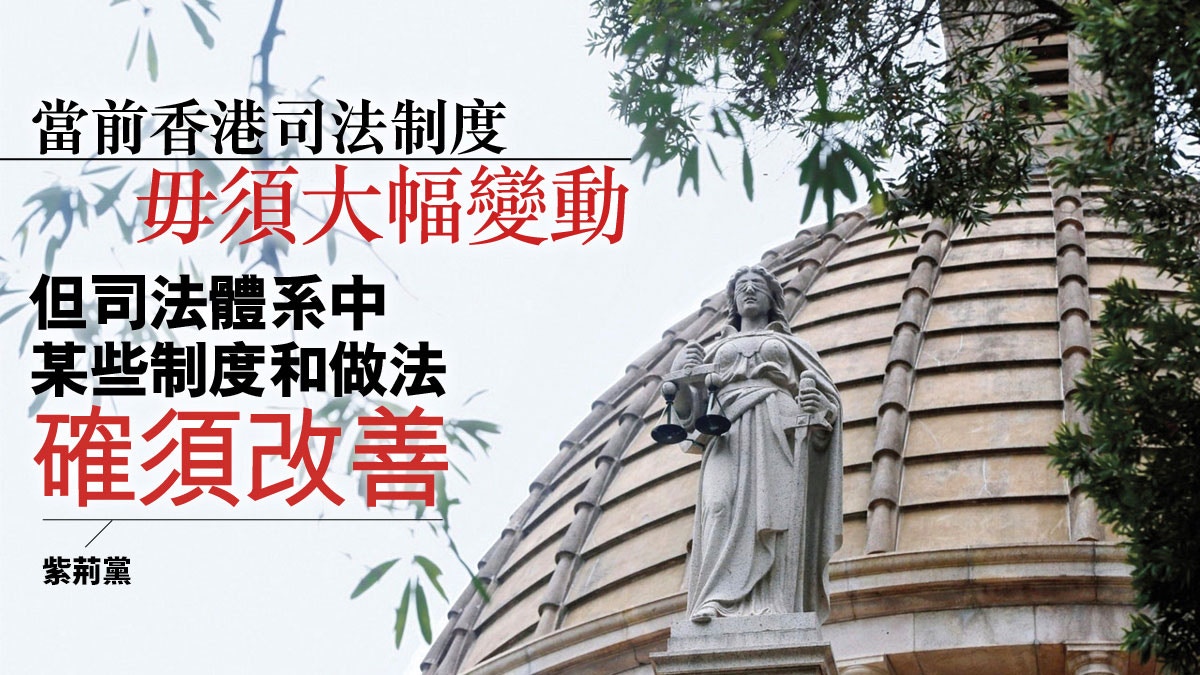weekly
Writer: Special writer
2021-05-18 20:30
Last update date: 2021-05-18 20:37
As multiple defendants involved in the "Regulation Amendment Disturbance" absconded and absconded, the reputation of Hong Kong's judiciary has been seriously damaged and has been frequently criticized by the public.
Regarding the misconduct of judicial personnel, the Independent Commission Against Corruption has the right to investigate, and the judicial institutions should also conduct reviews.
Under the new situation after the implementation of the National Security Law and the improvement of the electoral system, the judiciary will advance with the times and maintain social order and justice with a new spirit and outlook.
In the future adjustment process of the judiciary, we should continue to maintain Hong Kong’s local judicial independence and avoid two wrong tendencies: First, we believe that Hong Kong’s judicial system needs a revolution, the judiciary must expel foreign judges, and judicial trials do not allow the use of extraterritorial laws. And the precedent; the second is to deny the power of the Standing Committee of the National People's Congress in Hong Kong's judicial system, believing that the judicial system left over from the colonial era is perfect, the judicial personnel have not committed any mistakes, and the judicial institutions do not need to make any changes.
The local judicial independence of Hong Kong is not inborn, but a new thing after the reunification.
During the British Hong Kong era, Hong Kong formed a trial system including the Supreme Court, District Courts, Magistrates' Courts and Special Courts, but this system itself was not complete.
Although there was a Supreme Court in Hong Kong at that time, the Supreme Court did not have the power of final adjudication. The Ordinance on the Establishment of the Supreme Court of Hong Kong promulgated in 1844 stipulated that anyone who disagrees with the Supreme Court’s rulings, judgments, and pronouncements can apply to the Privy Council. The Emperor filed an appeal and the Judicial Committee of the Privy Council became Hong Kong's Court of Final Appeal.
After the reunification, the central government authorized Hong Kong to enjoy independent judicial power and the power of final adjudication through the Basic Law.
Local independent judicial power means that local judicial institutions are authorized by the constitution, and judges try cases independently in accordance with the law, free from interference by any force.
This not only upholds the principle of the rule of law, but also clearly defines the boundaries of Hong Kong's judicial power.
The local judicial independence of Hong Kong is not inborn, but a new thing after the reunification.
(Profile picture)
Article 81 of the Hong Kong Basic Law stipulates that the Special Administrative Region shall establish the Court of Final Appeal, the High Court, the District Court, the Magistrates Court and other specialized courts.
The judicial system that was originally implemented in Hong Kong and Britain, except for the changes caused by the establishment of the Court of Final Appeal, all other contents are retained.
The basic systems and principles applicable to judicial activities during the Hong Kong-British period were retained and implemented after the return, including the principle of precedent, the jury system, the lawyer system, and the presumption of innocence.
The Basic Law provides for the establishment of the Hong Kong Court of Final Appeal. Its operation marks the establishment of a complete judicial system in Hong Kong and the establishment of local judicial independence. The NPC Standing Committee’s interpretation of the Basic Law has become an important part of the new judicial system.
The establishment of the Hong Kong Court of Final Appeal system is one of the important signs of the end of British judicial sovereignty in Hong Kong.
Apart from the addition of the Court of Final Appeal, Hong Kong's original judicial system has basically been preserved.
Judging the "Seven Police Cases" by foreign judges has always been a hot topic in the society, and some radicals demand that overseas judges be dismissed as soon as possible.
This proposition not only violates the Basic Law, but also is not conducive to the prosperity and stability of Hong Kong.
Article 82 of the Basic Law authorizes the Court of Final Appeal to “invite judges from other common law jurisdictions to participate in trials as needed”; Article 92 of the Basic Law stipulates: “Judges and other judicial personnel of the Hong Kong Special Administrative Region shall And professional talents, and can be hired from other common law jurisdictions."
Except for the qualifications of Chinese citizens for the appointment of some high-level judges, the Basic Law does not impose any nationality restrictions on the personnel of other judicial institutions.
The work of judges from overseas in Hong Kong's judiciary reflects Hong Kong's high level of rule of law and also demonstrates the international community's confidence in Hong Kong's local judicial independence.
Hong Kong can develop into an international financial center and commercial hub, attracting a large amount of capital and talents. One of the important reasons is that Hong Kong has an independent judicial system, judges are not affected by external pressure, and they will not be biased by nationality or race. Either party.
If the Basic Law is amended at will to expel foreign judges, the confidence of the international community in Hong Kong's judicial system will be greatly reduced. This will undoubtedly damage Hong Kong's status as an international financial center and commercial hub.
Judging the "Seven Police Cases" by foreign judges has always been a hot topic in the society, and some radicals demand that overseas judges be dismissed as soon as possible.
(Photo/Photo by Zheng Zifeng)
Some people with nationalist views demand that Hong Kong courts no longer invoke extraterritorial precedents. This is also a wrong and harmful proposition.
After the reunification, Hong Kong courts have a legal basis for referencing cases in other common law jurisdictions.
Article 84 of the Basic Law clearly stipulates that Hong Kong courts can refer to cases in other common law jurisdictions when making judgments.
The Hong Kong courts use extraterritorial judicial precedents as the reasoning content, which helps the judge carefully and fairly consider the arguments put forward by the parties to the litigation, and reach their opinions after careful consideration, rather than just follow their own wishes, so that their judgments will be reflected. The principles of fairness, justice, transparency and consistency are convincing.
However, just as a high degree of autonomy does not mean complete autonomy, so local judicial independence does not mean that local justice is completely separated from the Chinese judicial system.
The Basic Law establishes the central judicial sovereignty and at the same time empowers Hong Kong courts to have independent but not complete judicial power.
The Hong Kong Court of Final Appeal has the power of final adjudication in local cases. This only shows that Hong Kong's local adjudication system is complete. It does not mean that Hong Kong enjoys complete judicial power like a sovereign country.
According to Article 158 of the Basic Law, the interpretation power of the Basic Law belongs to the Standing Committee of the National People’s Congress. It can authorize Hong Kong courts to interpret the provisions of the Basic Law within the scope of Hong Kong’s autonomy when hearing cases. The power of interpretation does not mean that the Hong Kong courts have the power to examine whether the actions of the SAR government and the Legislative Council violate the Basic Law.
It is not the power of the Hong Kong Court of Final Appeal to examine whether government policies and legislation by the Legislative Council comply with the Basic Law but the power of the Standing Committee of the National People's Congress.
The Hong Kong opposition and some media have talked about the "unconstitutional review" power of the Hong Kong judiciary. In fact, there is no legal basis.
Hong Kong’s Basic Law is not a constitution. As a unitary sovereign state, China can only have one constitution.
"Unconstitutional review" is the central authority, which can only be exercised by the central government, and local judicial institutions have no right to speak up.
Hong Kong is a local government in China, and its judiciary has no power to review the Basic Law, let alone review of unconstitutional law.
According to Article 158 of the Basic Law, the interpretation power of the Basic Law belongs to the Standing Committee of the National People's Congress, which can authorize Hong Kong courts to interpret the provisions of the Basic Law within the scope of Hong Kong's autonomy when hearing cases.
(Profile picture)
The current Hong Kong judicial system does not need to undergo traumatic changes, but certain specific systems and practices in the judicial system do need to be further improved.
For example, in hiring overseas judges, the problem of double allegiance to judges should be avoided.
According to Article 104 of the Basic Law, judges of all levels of courts must swear allegiance to the Hong Kong Special Administrative Region of the People's Republic of China when taking office.
Therefore, judges from overseas must be full-time staff, especially foreign politicians must not be mixed into the Hong Kong judicial team.
For another example, extraterritorial precedents should not be binding on Hong Kong case trials.
The word "reference" in Article 84 of the Basic Law does not mean that the Hong Kong courts must regard extraterritorial law as an authority and apply it as a legal basis.
As one of the common law jurisdictions, it is completely reasonable for Hong Kong courts to refer to extraterritorial laws in trials. However, the use of extraterritorial laws cannot go beyond the scope authorized by the Basic Law, and certain rules and conditions must be followed. They cannot act arbitrarily. This is actually the independence of Hong Kong’s local jurisdiction. Sexual requirements.
In addition, for issues such as sentencing deviations and abuse of judicial review that have been criticized by the public, the Hong Kong judiciary can refer to the systems of the United Kingdom and the United States and improve the structure and functions of the judicial system after conducting internal reviews.
We recommend that a sentencing committee be established to formulate sentencing guidelines, increase the certainty of judges' sentencing, and reduce the negative impact of judges’ personal subjective factors; we recommend the establishment of a new judicial supervision agency to include non-legal persons to strengthen the court’s connection with society. Enhancing judicial openness and transparency is actually an extension of the spirit of the jury system; it is recommended to set up a court specifically to handle judicial review applications to improve the quality and efficiency of the review process.
Hong Kong's judiciary should be adjusted in due course, but the principle of local judicial independence, which is the foundation of Hong Kong's Common Law, should not be shaken.
Facts have proved that for Hong Kong, a highly internationalized economy that combines Chinese and Western cultures, insisting on local judicial independence is in line with social and public conditions and is effective.
The local independent judicial system of Hong Kong has been respected by the international community for many years and has made irreplaceable contributions to the prosperity and stability of Hong Kong. It will continue to play its role in the years to come.
(The above was published in the 10th issue of "Bauhinia Weekly" of the Bauhinia Party)
Viewpoint of the Bauhinia Party|Hong Kong governance reform should learn from Deng Gong’s experience in employment
Viewpoint of the Bauhinia Party|Decolonization is an unavoidable issue for the SAR government
Judicial independence, the rule of law, the rule of law, one country, two systems, and the ethics of judges





/cloudfront-eu-central-1.images.arcpublishing.com/prisa/3I74UEXLYRBBRPGPSGWNN6WXH4.jpg)

